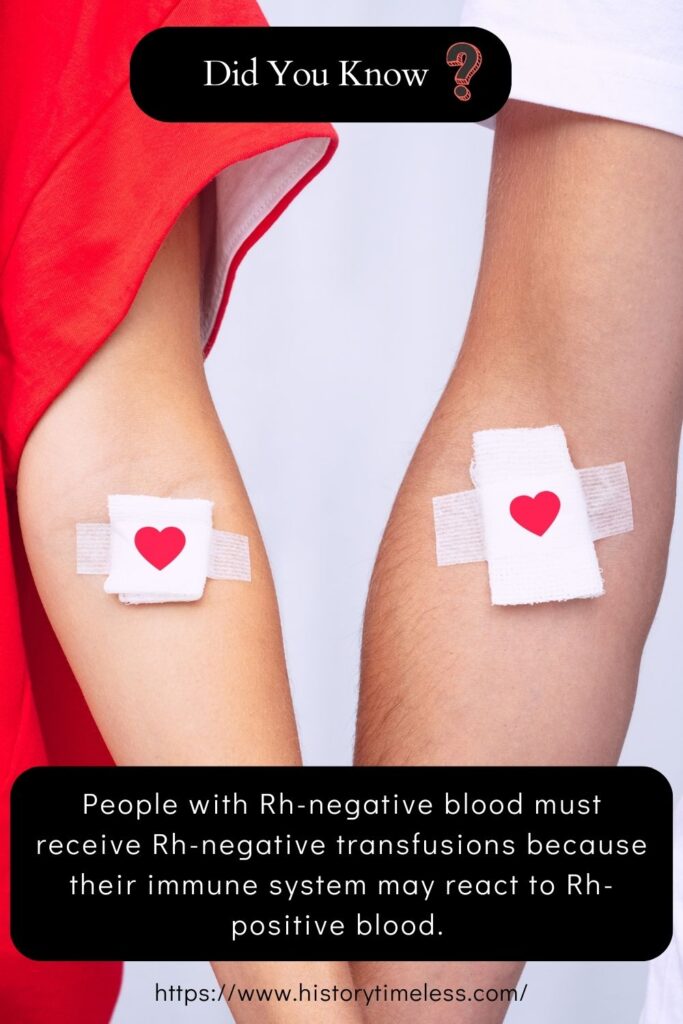Rh-negative blood is one of the most intriguing medical mysteries. While the majority of the global population is Rh-positive, a small percentage—around 15%—have Rh-negative blood.
This rare trait has sparked curiosity, theories, and even myths over time. From its impact on pregnancy to potential health benefits, Rh-negative blood carries a range of unique characteristics.
If you have this blood type or know someone who does, you’ll find these facts fascinating. Let’s dive into some remarkable insights about Rh-negative blood!
1. Rh-Negative Blood Is a Rare Genetic Trait
Only about 15% of the world’s population has Rh-negative blood, making it a rare genetic occurrence. The distribution varies across different ethnic groups, with the highest prevalence among European populations.
Scientists believe Rh-negative blood originated from a genetic mutation thousands of years ago. Unlike other blood type differences, the Rh factor plays a crucial role in pregnancy and transfusions.
This rarity can make it more difficult for Rh-negative individuals to find compatible donors, emphasizing the need for blood donation awareness.
2. Rh-Negative Pregnancies Can Be Risky Without Medical Care
When an Rh-negative mother carries an Rh-positive baby, her immune system may see the baby’s Rh-positive blood as a foreign threat.
This can trigger hemolytic disease of the newborn (HDN), leading to severe complications such as anemia or jaundice in the baby.
Fortunately, modern medicine has a solution—RhoGAM shots help prevent the mother’s immune system from attacking the baby’s red blood cells. Thanks to this treatment, Rh-negative women can have safe pregnancies without major complications.
3. Rh-Negative People Can Only Receive Rh-Negative Blood
People with Rh-negative blood must receive Rh-negative transfusions because their immune system may react to Rh-positive blood.

This limitation makes it crucial for Rh-negative individuals to donate blood, as their supply is naturally scarce.
In emergency situations, O-negative blood (the universal donor type) is often used because it lacks A, B, and Rh antigens, reducing the risk of a reaction. If you are Rh-negative, being aware of your blood type and potential donation opportunities can be life-saving.
4. The Origin of Rh-Negative Blood Remains a Mystery
Despite advances in genetics, the true origin of Rh-negative blood is still debated. Some theories suggest it came from a mutation in early human ancestors, while others believe it may have been introduced through ancient interbreeding with Neanderthals.
More speculative theories claim extraterrestrial origins, though there is no scientific evidence to support such ideas. What is clear is that Rh-negative blood follows a distinct inheritance pattern, passing only when both parents carry the Rh-negative gene.
5. Rh-Negative Individuals May Have Stronger Immunity
Some studies suggest that Rh-negative individuals might have a slight advantage when it comes to certain immune responses.
While research is ongoing, there is speculation that Rh-negative people might be less susceptible to some parasitic infections, including toxoplasmosis.
However, they may also be at a higher risk for autoimmune disorders, where the immune system mistakenly attacks the body. These potential health differences make Rh-negative blood an interesting subject for medical research.
6. O-Negative Blood Is the Universal Donor but Still Rare
O-negative blood is both Rh-negative and free from A and B antigens, making it the universal donor type. This means it can be given to anyone in an emergency when there is no time to determine a patient’s blood type.
However, only about 7% of the world’s population has O-negative blood, making it extremely valuable in hospitals and blood banks. If you have O-negative blood, donating regularly could help save countless lives.
7. Some Believe Rh-Negative Blood Is Linked to Unique Traits
Beyond its medical significance, Rh-negative blood has been associated with unique personality and physical traits.
Some anecdotal reports suggest that Rh-negative individuals tend to have higher IQs, greater intuition, and lower body temperatures.
While there’s no scientific consensus on these claims, they add to the mystery surrounding this rare blood type. Whether fact or fiction, Rh-negative blood continues to be a subject of fascination for many.
8. Rh-Negative Blood Is More Common in Certain Regions
While Rh-negative blood is rare worldwide, its prevalence varies by region. The highest concentration is found in European populations, particularly among the Basques of Spain and southern France, where up to 30% have Rh-negative blood.
In contrast, less than 1% of East Asians and Native Americans are Rh-negative. This uneven distribution has fueled theories about ancient migrations and genetic adaptations that influenced the spread of Rh-negative blood.
9. Rh-Negative People May Be More Prone to Certain Health Conditions
While Rh-negative blood has some advantages, research suggests it may also be linked to certain health risks. Some studies indicate a higher likelihood of autoimmune diseases, allergies, and anemia among Rh-negative individuals.
There is also speculation about a potential connection between Rh-negative blood and neurological conditions such as ADHD or migraines, though research is still inconclusive. This unique trait may come with both strengths and vulnerabilities.
10. Rh-Negative Blood Might Offer Some Resistance to Toxoplasmosis
Toxoplasmosis is a parasitic infection commonly transmitted through undercooked meat or cat feces. Some research suggests that Rh-negative individuals might have a slight resistance to the effects of this infection.
In studies, Rh-negative subjects showed different behavioral responses to toxoplasmosis compared to Rh-positive individuals.
While this doesn’t mean Rh-negative people are immune, it raises interesting questions about how blood type can influence disease susceptibility.
11. Blood Type Might Influence Personality and Behavior
In some cultures, blood type is believed to influence personality traits. While this idea is more popular in Japan and Korea (where people associate personality with ABO blood types), some theories extend this to Rh-negative individuals.
Some claim Rh-negative people are more independent, intuitive, and analytical. While there is no scientific evidence to support these claims, the connection between blood type and behavior remains an intriguing topic of discussion.
12. Some Believe Rh-Negative Blood Has Alien Origins
One of the most intriguing conspiracy theories surrounding Rh-negative blood is that it comes from extraterrestrial beings. Some theorists speculate that ancient aliens may have influenced human genetics, leading to the emergence of Rh-negative blood.
While there is no scientific basis for this claim, the rarity and unknown origins of Rh-negative blood continue to fuel speculation. Whether fact or fiction, this idea adds to the mystique of Rh-negative individuals.
13. Rh-Negative Blood Types Are Important for Rare Blood Banks
Because Rh-negative blood is less common, hospitals and blood banks rely on Rh-negative donors to ensure a stable supply.

Some organizations even specialize in rare blood banking to assist individuals who have extremely uncommon blood types.
If you’re Rh-negative, donating blood regularly can make a huge difference, especially for those with rare subtypes who struggle to find compatible donors.
14. The Rh Factor Was Discovered Thanks to Rhesus Monkeys
The Rh factor was first identified in the 1940s by Karl Landsteiner and Alexander Wiener during research on rhesus monkeys.
They discovered a protein on red blood cells that was present in some humans but absent in others. This led to the classification of Rh-positive and Rh-negative blood.
Although the name “Rh” comes from rhesus monkeys, the factor itself is not exclusive to primates. This discovery revolutionized blood transfusions and pregnancy care, saving countless lives.
15. Rh-Negative Blood May Have a Connection to Neanderthals
Some genetic research suggests that Rh-negative blood may have originated from Neanderthals or other ancient hominins.
Studies of Neanderthal DNA reveal that they carried variations of the Rh factor, which could explain why Rh-negative blood is more common in certain populations.
While not all experts agree, this theory adds to the intrigue surrounding the genetic history of Rh-negative individuals.
16. People With Rh-Negative Blood Are Encouraged to Know Their Type
Because Rh-negative individuals can only receive Rh-negative blood, it’s crucial for them to know their blood type in case of emergencies. Unlike Rh-positive individuals, who have more transfusion options, Rh-negative people face a greater challenge in finding compatible donors.
Carrying a blood type card or registering as a blood donor can help ensure quick and safe treatment in medical emergencies.
17. Some Cultures Associate Rh-Negative Blood With Royalty
Throughout history, certain royal families have been linked to Rh-negative blood. Some researchers claim that European royals, including Queen Victoria, carried the Rh-negative trait.
This has led to speculation that Rh-negative blood was more common among aristocratic lineages. While there is no definitive proof, the idea that Rh-negative blood is “royal blood” continues to spark curiosity and debate.
18. Rh-Negative Blood May Influence Pregnancy Outcomes
Beyond the risks of Rh incompatibility, some studies suggest that Rh-negative women might experience different pregnancy-related traits.
Some researchers speculate that Rh-negative women might be more prone to miscarriages if their partner is Rh-positive, while others suggest they could have a higher chance of twin pregnancies.
Though not fully understood, the impact of Rh-negative blood on fertility and pregnancy outcomes remains an area of ongoing research.
19. Rh-Negative Blood Is More Common in Certain Genetic Disorders
Some research has suggested a possible link between Rh-negative blood and conditions like scoliosis, Ehlers-Danlos syndrome (a connective tissue disorder), and certain autoimmune diseases.
While the connection is not fully understood, scientists continue to investigate whether Rh-negative individuals have unique genetic traits that could make them more susceptible to certain health conditions.
20. Rh-Negative Individuals May Experience More Negative Reactions to Transfusions
Because Rh-negative individuals lack the Rh protein, their immune systems are more likely to react to Rh-positive blood if transfused by mistake.
This immune response can lead to complications such as hemolysis, where the body attacks the transfused red blood cells.
This is why strict blood matching is essential for Rh-negative patients, and why hospitals take extra precautions when administering blood transfusions.
21. There Are More Rh-Negative Women Than Men
Interestingly, some studies suggest that Rh-negative blood is slightly more common in women than in men. While the reason for this difference isn’t fully understood, some researchers believe it could be due to natural selection and reproductive factors.
Because Rh incompatibility affects pregnancy, natural selection may have played a role in shaping Rh-negative prevalence in female populations over time.
22. Rh-Negative Blood May Affect COVID-19 Susceptibility
Some early studies during the COVID-19 pandemic suggested that people with Rh-negative blood might have a lower risk of severe illness compared to Rh-positive individuals.
Researchers speculated that blood type could play a role in immune response and inflammation. However, while some data hinted at a protective effect, other studies found no significant difference. The connection between blood type and disease susceptibility remains an ongoing area of medical research.
23. The Rarest Blood Type in the World Is Rh-Null
While Rh-negative blood is rare, the rarest blood type in the world is Rh-null, sometimes called “Golden Blood.” People with Rh-null lack all Rh antigens, making their blood extremely valuable for transfusions.
Fewer than 50 people worldwide are known to have Rh-null blood. Because of its extreme rarity, Rh-null blood donors are carefully tracked to ensure that it’s available for those who need it.
24. Some Believe Rh-Negative People Have Heightened Intuition
There is a popular belief that Rh-negative individuals possess heightened intuition, greater sensitivity to their surroundings, and even a higher tendency for psychic abilities.
While there is no scientific proof, many Rh-negative individuals report feeling more connected to their instincts and having stronger gut feelings. This claim adds another layer to the ongoing fascination with Rh-negative blood.
25. Rh-Negative Blood Has No Proven Evolutionary Disadvantage
Despite being a minority, Rh-negative individuals have persisted throughout human history. While some traits can disappear if they don’t provide an evolutionary advantage, Rh-negative blood has remained relatively stable in frequency.
Some scientists believe that this suggests Rh-negative blood offers benefits that are not yet fully understood. Whether through immunity advantages, reproductive factors, or other genetic benefits, Rh-negative blood continues to be an intriguing part of human evolution.
Grasp some remarkable pieces of info:
26 Weird Facts About Dream That Will Blow Your Mind!
25 Dark Psychology Facts That Mess With Your Mind!
20+ Insane Facts About Animals That Defy Belief!
15+ Interesting World Facts: Say ‘Wow’ to These Discoveries!





